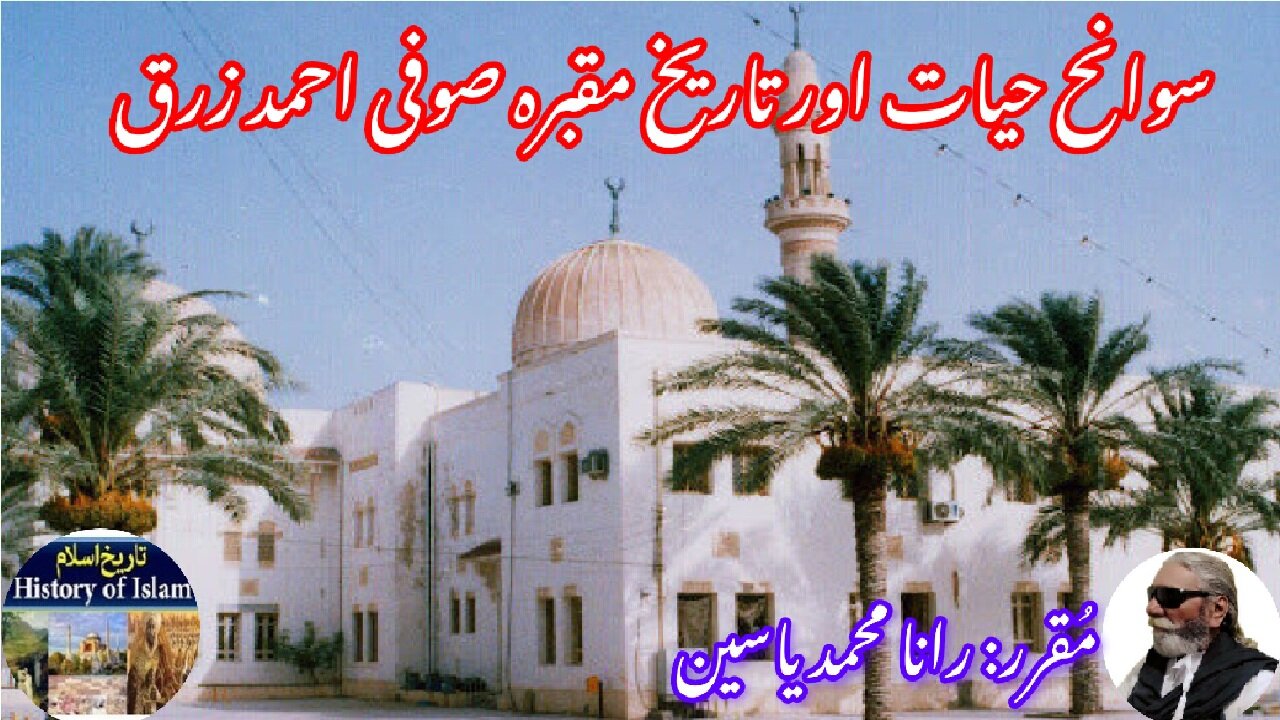Premium Only Content

Biography and Tomb of Ahmad Zarruq अहमद ज़र्रुक की जीवनी और मकबराسوانح حیات اور مقبرہ احمد زرق
@islamichistory813 #sufisaint #culturalheritage #islamicmysticism #islamicphilosophy #shrine #historicalfigures
#ahmadzarruq
Biography of Ahmad Zarruq
Ahmad Zarruq, a revered Islamic scholar and Sufi master, was born in the year 1440 CE (844 AH) in the city of Fez, Morocco. This vibrant city was an important cultural and intellectual hub during the medieval period, home to numerous scholars, poets, and philosophers. Zarruq's early life in such an environment greatly influenced his intellectual and spiritual development. His family was known for its scholarly lineage, which instilled in him a deep respect for knowledge from a young age.
Growing up in Fez, Zarruq was exposed to various disciplines, including Islamic jurisprudence, theology, and Sufism. His parents recognized his intellectual potential and encouraged him to pursue education rigorously. Zarruq was known for his keen intellect and unwavering dedication to learning, often engaging with prominent scholars of his time. His early education laid a strong foundation in Islamic sciences, shaping his future contributions to Sufism and Islamic jurisprudence.
Zarruq’s educational journey began at the local madrassas of Fez, where he studied under notable scholars. He immersed himself in classical texts, focusing on Islamic law, philosophy, and Sufi literature. His studies were not limited to traditional Islamic texts; he also explored the works of philosophers and thinkers from various backgrounds, seeking a broader understanding of the world. Zarruq was known to travel extensively across the Maghreb and beyond to enhance his knowledge, studying under various teachers who imparted their wisdom to him.
Among his notable teachers were esteemed scholars who influenced his understanding of Sufism and Islamic law. Zarruq eventually became a proficient scholar in both fields, merging the esoteric teachings of Sufism with the exoteric principles of Islamic jurisprudence. His unique approach emphasized the importance of inner purification alongside the adherence to Islamic law, a theme that would resonate throughout his works.
Ahmad Zarruq is best known for his profound contributions to Sufism and Islamic jurisprudence. He is recognized as one of the most influential Sufi masters of his time, and his teachings have had a lasting impact on the Sufi tradition. Zarruq’s philosophy revolved around the integration of outward religious practices and inner spiritual experiences. He emphasized that true knowledge and understanding of God could only be attained through a sincere heart and a purified soul.
One of Zarruq's key teachings was the importance of adhering to the Shari'ah (Islamic law) as a means to attain spiritual enlightenment. He argued that the outer practice of Islam, when combined with genuine devotion and inner reflection, leads to a more profound relationship with the Divine. This integration of law and spirituality became a hallmark of his teachings, attracting a diverse following among scholars and Sufis alike.
Zarruq authored several significant works that addressed various aspects of Islamic spirituality and law. His most famous treatise, “Al-Qawa'id,” provides a comprehensive overview of Sufi ethics and principles, offering practical guidance for those seeking to navigate the complexities of spiritual life. In this work, Zarruq outlines the characteristics of a true Sufi, emphasizing the necessity of humility, self-discipline, and unwavering devotion to God.
His teachings also explored the concept of the “perfect human” (Insan al-Kamil), a central theme in Sufi thought. Zarruq believed that each individual possesses the potential to achieve perfection through sincere devotion and adherence to Islamic principles. His insights on self-awareness, personal growth, and spiritual development have continued to inspire generations of Sufi practitioners and scholars.
Ahmad Zarruq passed away in 1493 CE (899 AH) in the city of Fez, where he had spent most of his life. His death marked the end of an era in Moroccan Sufism, but his legacy endured through his teachings and the many disciples he had influenced throughout his life. Zarruq's passing was deeply mourned, and he was regarded as a saintly figure in the Sufi community.
His shrine, located in Fez, has become a significant pilgrimage site for Sufi practitioners and scholars. The shrine is a place of reverence, where visitors come to pay their respects and seek blessings. It is often adorned with inscriptions of his teachings and sayings, serving as a reminder of his profound wisdom. The site has also become a center for spiritual gatherings, where followers engage in prayers, remembrance, and discussions about his teachings.
The construction of Ahmad Zarruq's shrine was undertaken by his devoted followers shortly after his death. They sought to honor his memory and ensure that his teachings continued to inspire future generations. Over the years, the shrine has undergone various renovations, reflecting the evolving architectural styles and cultural influences of the region. Despite these changes, the essence of Zarruq’s teachings remains intact, making it a sanctuary for those seeking spiritual guidance.
Ahmad Zarruq’s life and teachings represent a rich legacy within the Sufi tradition and Islamic scholarship. His contributions to the integration of Sufism and Islamic law have left an indelible mark on the spiritual landscape of the Islamic world. Zarruq’s emphasis on the importance of inner purification, devotion, and adherence to Islamic principles resonates with seekers of truth and knowledge. His shrine in Fez stands as a testament to his enduring influence, attracting visitors who seek inspiration and spiritual enlightenment through his teachings. The legacy of Ahmad Zarruq continues to thrive, embodying the timeless values of compassion, humility, and love that he so passionately advocated throughout his life.
====================
-
 1:02:23
1:02:23
In The Litter Box w/ Jewels & Catturd
23 hours agoDEI Kills | In the Litter Box w/ Jewels & Catturd – Ep. 744 – 2/18/2025
115K55 -
 1:06:37
1:06:37
Game On!
5 hours ago $0.58 earnedBreaking Down COLLEGE BASKETBALL BETTING LINES Like a Pro!
29.4K3 -
 1:01:29
1:01:29
John Crump Live
7 hours ago $2.41 earnedMexico Backs Cartels By Threatening To Designate Gun Manufactures As Terrorist!
30.4K10 -
![[Ep 611] DOGE On The March! | Guest Sam Anthony - [your]NEWS | Seditious Dems | Ukraine](https://1a-1791.com/video/fwe1/97/s8/1/q/C/C/3/qCC3x.0kob-small-Ep-611-DOGE-On-The-March-Gu.jpg) 2:14:09
2:14:09
The Nunn Report - w/ Dan Nunn
5 hours ago[Ep 611] DOGE On The March! | Guest Sam Anthony - [your]NEWS | Seditious Dems | Ukraine
32.6K12 -
 1:00:56
1:00:56
The Tom Renz Show
11 hours agoThe War On DOGE Is ALSO A War On The Economy
44.9K12 -
 1:30:16
1:30:16
Steve-O's Wild Ride! Podcast
5 days ago $2.48 earnedAri Shaffir Exposes The Dark Side of Podcasting - Wild Ride #252
65.3K3 -
 1:56:29
1:56:29
The Quartering
9 hours agoAirplane FLIPS and CRASHES, Sean Duffy Slams Pete Buttigieg, & What Happened with Patriarchy Hannah
101K41 -
 37:08
37:08
Standpoint with Gabe Groisman
1 day agoDOGE The UK?! With Liz Truss
56.4K18 -
 56:39
56:39
SLS - Street League Skateboarding
6 days agoHIGHEST SCORING KNOCKOUT ROUND OF ALL TIME! Felipe Gustavo, Dashawn Jordan, Filipe Mota & more...
41.5K2 -
 14:26
14:26
Breaking Points
1 day agoWOKE VS BASED?: Saagar And Ryan Play A Game
40.7K6